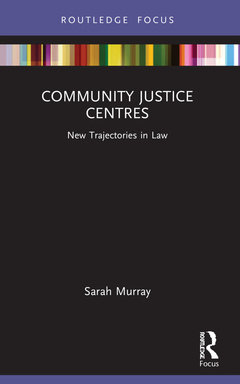Community Justice Centres New Trajectories in Law New Trajectories in Law Series
Auteur : Murray Sarah

This book examines the phenomenon of Community Justice Centres and their potential to transform the justice landscape by tackling the underlying causes of crime.
Marred by recidivism, addiction, family violence, overflowing courtrooms, crippling prison spending and extreme rates of incarceration, the criminal justice system is in crisis. Community Justice Centres seek to combat this by tackling the underlying causes of crime in a particular neighbourhood and working with local people to redesign the experience of justice and enhance the notion of community. A Community Justice Centre houses a court which works with an interdisciplinary team to address the causes of criminality such as drug addiction, cognitive impairment, mental illness, poverty, abuse and intergenerational trauma. The community thus becomes a key agent of change, partnering with the Centre to tackle local issues and improve safety and community cohesion. This book, based on research into this innovative justice model, examines case studies from around the world, the challenges presented by the model and the potential for bringing its learnings into the mainstream.
This book will appeal to academics in law and criminology as well as psychology; it will also be of considerable interest to people working in the criminal justice system, including the police, government policy advisers, psychologists and social workers.
Preface. Introduction: Court Reform and the Community Justice Centre Experience – Midtown and Beyond. 2 The Community Justice Centre Model. 3 Case studies of Community Justice. 4 Lessons from Community Justice: Evaluations, Boundaries and Obstacles. 5 The Possibilities of Mainstreaming the Model. 6 Conclusion: The Future of Community Justice: Prospects and Challenges.
Dr Sarah Murray is a Professor of Law at the University of Western Australia Law School where she researches in the areas of constitutional law and court innovation.
Date de parution : 05-2023
13.8x21.6 cm
Date de parution : 09-2021
13.8x21.6 cm
Thèmes de Community Justice Centres :
Mots-clés :
Community Justice Center; Neighbourhood Justice Centre; Community Justice; Red Hook Community Justice Center; Community Court; North Liverpool Community Justice Centre; Justice Centres; Midtown Community Court; Red Hook; Community Justice Model; Therapeutic Jurisprudence; Mainstream Courts; Young Man; Community Justice Initiatives; Mental Health Courts; Red Hook Community; Judicial Officer; Restorative Justice; Client Services Team; Active Citizen Engagement; Housing Resource Center; Drug Courts; Magistrate Fanning; Local Knowledge; Wo



